Organization for Security and Cooperation in Europe
Organization for Security and Cooperation in Europe: Travel tips, articles, photos, gallery, cities database, population, pics, flags, statistics, free maps online
About the OSCE
With 56 participating States from Europe, Central Asia and North America, the Organization for Security and Co-operation in Europe (OSCE) forms the largest regional security organization in the world.
The OSCE is a primary instrument for early warning, conflict prevention, crisis management and post-conflict rehabilitation in its area. It has 19 missions or field operations in South-Eastern Europe, Eastern Europe, the Caucasus and Central Asia.
The Organization deals with three dimensions of security - the politico-military, the economic and environmental, and the human dimension. It therefore addresses a wide range of security-related concerns, including arms control, confidence- and security-building measures, human rights, national minorities, democratization, policing strategies, counter-terrorism and economic and environmental activities. All 56 participating States enjoy equal status, and decisions are taken by consensus on a politically, but not legally binding basis.
Budget
On 2 February 2007, the Permanent Council approved the OSCE Unified Budget for 2007, amounting to 168,200,000 euros (PC Decision No 780).
In 2006, the approved budget amounted to approximately 163,000,000 euros, nearly 72 per cent of which went to field activities. Extra-budgetary contributions for additional activities amounted to approximately 25,000,000 euros in 2006.
Staffing and employment
The OSCE employs some 450 people in its various institutions and around 3,000 in its field operations. Locally-contracted employees outnumber international seconded employees by roughly five to one. Seconded staff members are funded by their national administrations.
History of the OSCE
The OSCE traces its origins to the détente phase of the early 1970s, when the Conference on Security and Co-operation in Europe (CSCE) was created to serve as a multilateral forum for dialogue and negotiation between East and West. Meeting over two years in Helsinki and Geneva, the CSCE reached agreement on the Helsinki Final Act, which was signed on 1 August 1975. This document contained a number of key commitments on polito-military, economic and environmental and human rights issues that became central to the so-called 'Helsinki process'. It also established ten fundamental principles (the 'Decalogue') governing the behaviour of States towards their citizens, as well as towards each other.
Until 1990, the CSCE functioned mainly as a series of meetings and conferences that built on and extended the participating States' commitments, while periodically reviewing their implementation. However, with the end of the Cold War, the Paris Summit of November 1990 set the CSCE on a new course. In the Charter of Paris for a New Europe, the CSCE was called upon to play its part in managing the historic change taking place in Europe and responding to the new challenges of the post-Cold War period, which led to its acquiring permanent institutions and operational capabilities.
As part of this institutionalization process, the name was changed from the CSCE to the OSCE by a decision of the Budapest Summit of Heads of State or Government in December 1994.
Source: www.osce.org |

